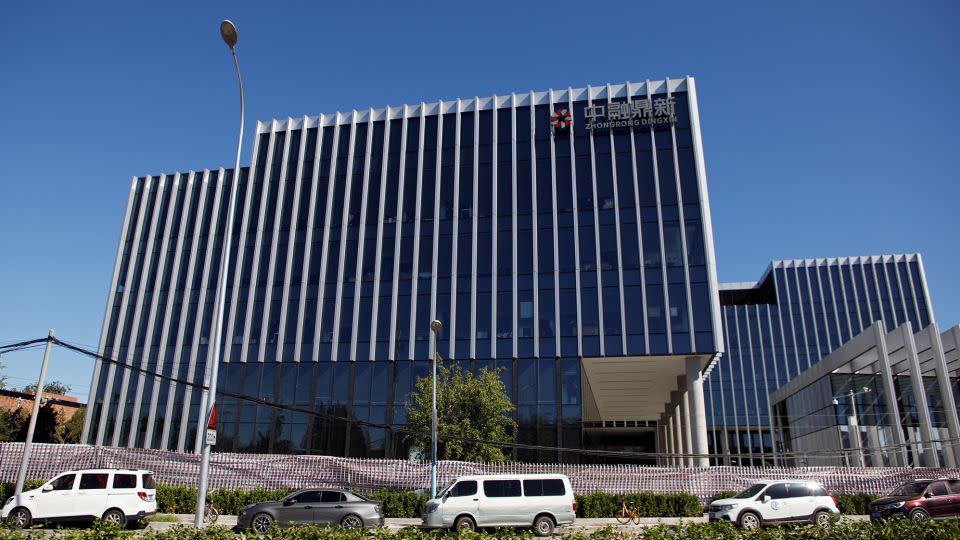China’s real estate crisis is coming for its massive shadow banks
Moody’s surprise downgrade of China’s credit outlook this week has reinforced concerns that the crisis in the country’s real estate market is spilling over into the wider economy.
While the risk of contagion — particularly via losses at so-called shadow banks — is growing, analysts say China is not experiencing a ”Lehman moment,” a reference to the 2008 real-estate linked collapse of the bank that marked a major worsening of the global financial crisis.
Even so, investors outside of China should pay attention, says Larry Hu, chief China economist at Macquarie Group, because of the impact on the country’s growth.
“The current property downturn has been the biggest drag on the Chinese economy over the past couple years, and also the biggest tail risk at this moment,” he said, referring to something that is unlikely to occur but could still happen.
Of particular concern is the spillover effect on the “shadow banking sector,” a mysterious and enormous part of China’s financial landscape.
The industry, worth about $3 trillion at its narrowest definition and as much as $12 trillion if asset management products and consumers loans are included, has come under the spotlight in recent months because two major players have failed to make payments they owe to investors. Both of them have significant exposure to the property market.
Zhongzhi Enterprise Group, one of the country’s largest financial conglomerates, declared itself insolvent last month after missing payments on dozens of investment products. The company is now at the center of a criminal investigation by the police.
Two weeks after Zhongzhi revealed its financial troubles, China’s state media reported that Wanxiang Trust, an investment and asset management firm in Hangzhou, had delayed payments worth several hundred million dollars on a number of investment products.
Shadow banking ‘meltdown’
The problems at the two investment companies have fuelled fears about the risk of financial contagion from the worsening property market downturn on investors who did not directly purchase homes. Huge developers such as Evergrande and Country Garden have defaulted on their debt.
“Shadow banking generally represented a significant source of capital for real estate developers, and the implosion of private developers is now rocking the shadow banking sector,” said Brock Silvers, chief investment officer for Kaiyuan Capital in Hong Kong.
Shadow banking refers to financial activity that takes place outside the traditional banking system.
In the West, it often involves lending by private equity firms or hedge funds. In China, it involves different forms of financing activity, some of which include banks. Common forms of shadow banking include the use of wealth management products, trust products or entrusted loans.
Silvers said the problems affecting shadow banks likely aren’t restricted to Zhongzhi or Wanxiang, adding “a wider meltdown [in the industry] seems imminent.”

On Tuesday, shortly after the announcement by Moody’s, S&P Global Ratings also warned that spillovers from China’s real estate industry could reverberate across the economy, either through losses for banks and other financial institutions or through negative effects on investor and consumer sentiment.
The shadow banking industry, broadly defined, reached $12 trillion in total size, accounting for 86% of China’s GDP in 2019, according to a report published by the country’s top banking regulator, which was also the first government report on the opaque sector.
Trust firms, which pool savings to provide loans, were one of the fastest growing segments in shadow banking during the past decade. The industry has been a popular way for cash-hungry property developers and local governments to raise funds from millions of Chinese.
By the end of 2022, assets held by trust firms totalled 21 trillion yuan ($2.9 trillion), an eightfold increase from 2010, according to the China Trustee Association.
Defaults on trust investment products, especially those linked to real estate, have increased over the past two years. In 2022, real estate trust defaults totalled 93 billion yuan ($13.1 billion), up slightly from 91.7 billion yuan ($12.9 billion) in 2021, according to Chinese data provider Use Trust.
Zhongrong International Trust, which is partially owned by Zhongzhi, invests about 10% of its funds in real estate, according to the company. It has lent money to several struggling property developers, including Evergrande Group and Sunac China, which have also defaulted on their debt.
Wanxiang Trust also has a sizeable exposure to real estate, with 58% of its assets under management in the sector. One of its troubled trust products invested in Kaisa Group, which defaulted on its debt in 2021 and currently faces a winding-up petition in a Hong Kong court.

Debt pressures
The liquidity crunch at trust firms may cause turmoil in the local bond market and put financial pressure on Chinese companies and local government entities.
Trust firms may need to sell more liquid assets in their portfolios, such as corporate bonds and local government bonds, to prepare for the repayment of trust products coming due, Citi analysts said in an August note.
“This could trigger a bond price correction and hinder companies’ financing access,” they said.
That could potentially leading to debt-servicing challenges or even default pressure for companies or certain local government financial vehicles that face maturing debt payments in the near term, they added.
Local government debt in China has soared largely due to a sharp drop in land sale revenues because of the property slump, as well as the lingering impact of the cost of imposing pandemic lockdowns.
Data from the International Monetary Fund showed China’s local government debt reached 92 trillion yuan ($12.9 trillion) in 2022, up 50% from 2019.
Among those liabilities — so-called “hidden debt,” which is usually concentrated in local government financial vehicles and do not appear on government balance sheets — might have amounted to almost $10 trillion, according to an October analysis by research firm Mars Macro.
No systemic risk
China’s shadow banks may be mired in problems, but they’re unlikely to cause a wider banking crisis, according to experts, as they are still a small part of the banking system.
“In my view, the recent woes in the shadow banking sector will not lead to a systemic crisis, mainly because the formal banking sector has very limited exposure to these trust companies,” said Hu.
“Moreover, trust products are mainly sold to high net wealth investors, not ordinary people,” Hu said.
According to Chinese regulations, individuals qualified to invest in trust products must have a minimum net worth of three million yuan ($421,793) or average annual income of no less than 400,000 yuan ($56,239) in the previous three years.
Trust assets represented only 5.3% of the banking industry’s assets in the first quarter of 2023, according to CNN calculation based on data from the China Trustee Association and the People’s Bank of China.
Trust firms have also been reducing their exposure to the property market. Property trust investments stood at 1.13 trillion yuan ($159 billion), accounting for 5.3% of total trust investments and 0.3% of the banking system’s assets, in the first quarter of this year. The amount was down 28% from the same period last year.
“The [contagion] risk is manageable because the trust industry’s property exposure has dropped significantly,” said Ming Tan, director at S&P Global Ratings, adding that he doesn’t believe trust defaults will trigger a banking crisis because wealthy investors and corporates will shoulder the losses.
“This gives the government some tolerance for market-based resolutions,” he added.
Analysts are also confident that Beijing would step in to prevent widespread damage.
“Chinese authorities still have very strong will and capacity to ensure the financial system remains stable despite the property market downturn, because domestic banks play quasi-policy roles and a majority of them have state ownership,” Moody’s said last month.
The government has a variety of tools it can use to prevent a domino effect, including the provision of liquidity to distressed financial institutions, they added.
Last month, China’s leaders pledged to address risks more systematically across the financial sector and preserve stability.
For more CNN news and newsletters create an account at CNN.com

 Yahoo Finance
Yahoo Finance 